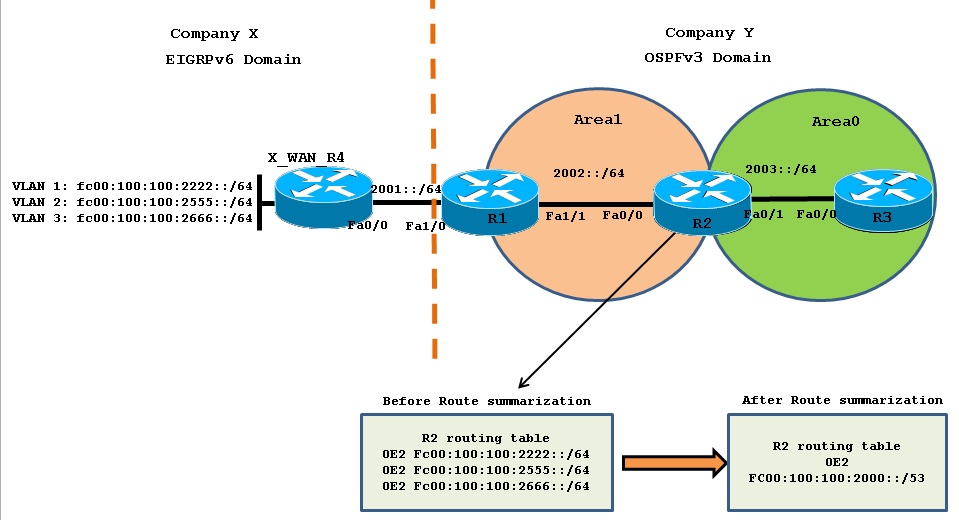- Cisco Community
- Technology and Support
- Networking
- Networking Knowledge Base
- OSPFv3 Route Summarization Part-II (External route summarization )
- Subscribe to RSS Feed
- Mark as New
- Mark as Read
- Bookmark
- Subscribe
- Printer Friendly Page
- Report Inappropriate Content
- Subscribe to RSS Feed
- Mark as New
- Mark as Read
- Bookmark
- Subscribe
- Printer Friendly Page
- Report Inappropriate Content
02-04-2013 01:53 AM - edited 03-01-2019 04:53 PM
Introduction:
In part-I we discussed on OSPFv3 inter-area route summarization; in this document we will discuss OSPF external route summarization. External route summarization is specific to external routes that are injected into OSPFv3 using route redistribution. When you redistribute route in OSPF domain; router called ASBR generate Autonomous system external LSAs (Type 5) and flooded toward Area 0, or the backbone area. Then backbone area, in turn, floods the link states to the other areas.
Background:
External route summarization in OSPFv3 is achieved by using “summary-prefix <summary IPv6 prefix / prefix length>” command on ASBR.
Configuration Example:
In below example Company X want to share some of their subnets with Company Y. Company X is running EIGRPv6 in their organization as routing protocol and Company Y is using OSPFv3 .We are redistributing following subnets learn from EIGRPv6 to OSPFv3, but we don’t want to advertise individual prefixes to OSPF domain So we will summarize these prefixes on ABSR i.e. on R1
R1 learns following route from router X_WAN_R4 using EIGRPv6 which then redistributed to OSPV3 to advertise this routes in OSPF domain.
fc00:100:100:2222::/64
fc00:100:100:2555::/64
fc00:100:100:2666::/64
Topology Diagram:

Before summarization R2’s and R3’s routing table shows these prefixes as individual externally learn prefixes:
R2#sh ipv6 route ospf | sec OE2
O - OSPF intra, OI - OSPF inter, OE1 - OSPF ext 1, OE2 - OSPF ext 2
OE2 FC00:100:100:2222::/64 [110/20]
via FE80::C800:25FF:FEBC:1D, FastEthernet0/0
OE2 FC00:100:100:2555::/64 [110/20]
via FE80::C800:25FF:FEBC:1D, FastEthernet0/0
OE2 FC00:100:100:2666::/64 [110/20]
via FE80::C800:25FF:FEBC:1D, FastEthernet0/0
R3#sh ipv6 route ospf | sec OE2
O - OSPF intra, OI - OSPF inter, OE1 - OSPF ext 1, OE2 - OSPF ext 2
OE2 FC00:100:100:2222::/64 [110/20]
via FE80::C201:15FF:FE88:1, FastEthernet0/0
OE2 FC00:100:100:2555::/64 [110/20]
via FE80::C201:15FF:FE88:1, FastEthernet0/0
OE2 FC00:100:100:2666::/64 [110/20]
via FE80::C201:15FF:FE88:1, FastEthernet0/0
To summarized prefix there are two steps:
A) You need to find Summary prefix and prefix lengh
B) Configure the “summary-prefix <summary IPv6 prefix / prefix length>” command under OSPFv3 process:
A) Calculation of Summery prefix:
We have to summarize the following routes:
fc00:100:100:2222::/64
fc00:100:100:2555::/64
fc00:100:100:2666::/64
1) Identify where you can do the summarization. In our example 1st three hexadecimal places are same hence summarization can be done in the 4th hexadecimal place. So we know our subnet will be somewhere between /48 and /64.
2) You need to break it down in binary:
2222= 0010 0010 0010 0010
2555= 0010 0101 0101 0101
2666= 0010 0110 0110 0110
3) Find the common bits then Set the rest bits to 0 and calculate the summary by converting into hex.
2222= 0010 0010 0010 0010
2555= 0010 0101 0101 0101
2666= 0010 0110 0110 0110
Common bits=0010 0
Summary = 0010 0000 0000 0000 = 2000 (In Hex)
4) Calculate subnet mask by adding the common bits to the lower of our subnet range. This means we need to add 5 to /48 which makes /53.
So our summary address is FC00:100:100:2000::/53
B) Configure the summary prefix command On ASBR under OSPFv3 process:
R1(config)#ipv6 router ospf 100
R1(config-rtr)#summary-prefix FC00:100:100:2000::/53
R1(config-rtr)#end
After configuring summarization on R1, R2 and R3 receives only summary route FC00:100:100:2000::/53 not individual type 5 LSA for each prefixes from R1 as shown below:
R2#sh ipv6 route ospf | sec OE2
O - OSPF intra, OI - OSPF inter, OE1 - OSPF ext 1, OE2 - OSPF ext 2
OE2 FC00:100:100:2000::/53 [110/20]
via FE80::C800:25FF:FEBC:1D, FastEthernet0/0
R3#sh ipv6 route ospf | sec OE2
O - OSPF intra, OI - OSPF inter, OE1 - OSPF ext 1, OE2 - OSPF ext 2
OE2 FC00:100:100:2000::/53 [110/20]
via FE80::C201:15FF:FE88:1, FastEthernet0/0
R2#sh ipv6 ospf database external
OSPFv3 Router with ID (2.2.2.2) (Process ID 100)
Type-5 AS External Link States
Routing Bit Set on this LSA
LS age: 1710
LS Type: AS External Link
Link State ID: 6
Advertising Router: 1.1.1.1
LS Seq Number: 80000001
Checksum: 0x7529
Length: 36
Prefix Address: FC00:100:100:2000::
Prefix Length: 53, Options: None
Metric Type: 2 (Larger than any link state path)
Metric: 20
R3#sh ipv6 ospf database | beg External
Type-5 AS External Link States
ADV Router Age Seq# Prefix
1.1.1.1 1850 0x80000001 FC00:100:100:2000::/53
Summarization reduces the number of routing table entries. As well Type5 LSA flooding in the network and saves router CPU resource.
Discard route:
ASBR also generate discard route same like ABR generate during internal area summarization to prevent routing loops.
R1#sh ipv6 route ospf | include 0
IPv6 Routing Table - default - 10 entries
OI 2003::/64 [110/2]
via FE80::C201:15FF:FE88:0, FastEthernet1/1
O FC00:100:100:2000::/53 [110/0]
via Null0, directly connected
If you want to disable creation of the discard route, you can use the “no discard-route external” command as follows:
R1#conf t
Enter configuration commands, one per line. End with CNTL/Z.
R1(config)#ipv6 router ospf 100
R1(config-rtr)#no discard-route external
R1(config-rtr)#end
R1#
Related information:
Find answers to your questions by entering keywords or phrases in the Search bar above. New here? Use these resources to familiarize yourself with the community: